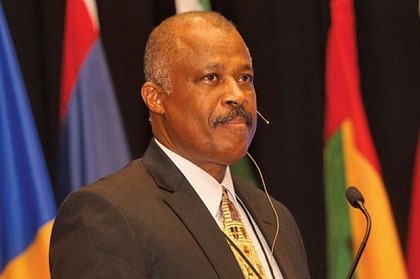BRIDGETOWN, Barbados, CMC – Distinguished academic and cricket historian, Professor Sir Hilary Beckles, believes the “tide is turning” in West Indies cricket, and contends the excellence of the “Jason Holder generation” could lead to a revival of the former World champions.
Speaking during a public lecture series here entitled “Fire in Babylon: Cricket as Popular Culture”, Sir Hilary pointed out that a new consciousness existed in the young generation of current Windies cricketers and as a result, they were now attempting to reconnect with previous high standards of excellence.
He also argued that the development of Caribbean society and West Indies success were intertwined and once societal issues in the region were addressed, he could foresee the emergence of a strong Windies side “in seven to eight years.”

“I believe we are now seeing our way out of this. I believe that the tide is turning – I don’t think it is empty optimism. I believe the tide is turning,” said Sir Hilary, the Vice-Chancellor of the University of the West Indies and former principal of UWI Cave Hill Campus.
“I believe that the current generation of young cricketers who are coming up – I call them the Jason Holder generation. I believe they are seeing the society differently.
“I’ve spoken to them, most of them are UWI students anyway. They come to the University, they are working class boys and we speak to them. All the young cricketers – Jason Holder, Carlos Brathwaite – these young men who are ready and willing to fight for us.”
He continued: “I have sat in classroom sessions like this with them, to speak about history, to speak about cultural responsibility, nationhood, to explain to them what the IMF (International Monetary Fund) is all about.
“This younger generation who have come through the academy, they understand the problem and they want to reconnect to the Vivian Richards, Michael Holding generation. They want to look over the head of (Chris) Gayle and (Brian) Lara and they want to reconnect with Viv Richards and Michael Holding. It’s a cycle.”
West Indies have been stuck a protracted state of under-performance over the last two decades, and have slumped to historic lows of ninth in both the Test and One-Day International formats.
They have won only four of their last 22 Tests inside the last two years and last year alone, won just three of 23 ODIs, sparking widespread criticism from fans.
But referencing the recent general elections in Barbados where the country elected its first woman prime minister Mia Mottley in a clean sweep of all 30 seats, Sir Hilary said it was evident citizens were demanding of their political and cricketing representatives a standard of excellence.
“Many of you who have seen the team in decline, what your criticism showed was a lack of effort. Many of you were saying ‘I don’t mind the boys losing but show more effort, show more passion, give us some passion,’” Sir Hilary explained.
“But I believe those fans and citizens are coming around again and I believe that to be true because of my association with these young men. All of these things are connected.
“So what I described … as the Mia Mottley revolution in Barbados – all of these things are connected. People are coming gradually to realise that there has to be a standard of expectation from the government and citizens are asking for a minimum threshold, and nobody must fall below that minimum threshold.”
Sir Hilary, who has written several books on West Indies cricket, said he was seeing signs of the changing tide across the region but was careful to note he was not predicting a return to the halcyon days.
He also reiterated the linkages between the region’s political development and Windies cricket, and the need for the continued growth of Caribbean society.
“These things are indeed connected. I have seen it in Kingston, I have seen it in Port of Spain. There is a turning of the tide,” he stressed.
“I cannot say this will be to the resurgence of our Test dominance but what I will say is that there are elements that will constitute the potential for excellence, those elements are being put in place and are coming together.
“And I would like to imagine, and I don’t believe in linearity, but I would not be surprised if in seven to eight years or so we become competitive again in this form of the game but first of all I believe we have to fix Caribbean societies.”
